At Techdirt, Glyn Moody explains why the attempt to add DRM to the HTML5 standard is doomed to failure:
You would have thought by now that people would understand that DRM is not only a bad idea, but totally unnecessary: Apple dropped DRM from music downloads in 2009 and seems to be making ends meet. Despite these obvious truths, the stupidity that is DRM continues to spread. Here, for example, is a particularly stupid example of DRM stupidity, as revealed by Manu Sporny:
A few days ago, a new proposal was put forward in the HTML Working Group (HTML WG) by Microsoft, Netflix, and Google to take DRM in HTML5 to the next stage of standardization at W3C.
After all, this is exactly what Web users have been crying out for: “just give us DRM for the Web, and our lives will be complete….”
[. . .]
That clearly implies that when people are not sharing their own content with family and friends, then they are indeed adversaries:
This “user is not an adversary” text can be found in the first question about use cases. It insinuates that people that listen to radio and watch movies online are potential adversaries. As a business owner, I think that’s a terrible way to frame your customers.
Thinking of the people that are using the technology that you’re specifying as “adversaries” is also largely wrong. 99.999% of people using DRM-based systems to view content are doing it legally. The folks that are pirating content are not sitting down and viewing the DRM stream, they have acquired a non-DRM stream from somewhere else, like Mega or The Pirate Bay, and are watching that.
This is the fundamental reason why DRM is doomed and should be discarded: the only people it annoys are the ones who have tried to support creators by acquiring legal copies. How stupid is that?




